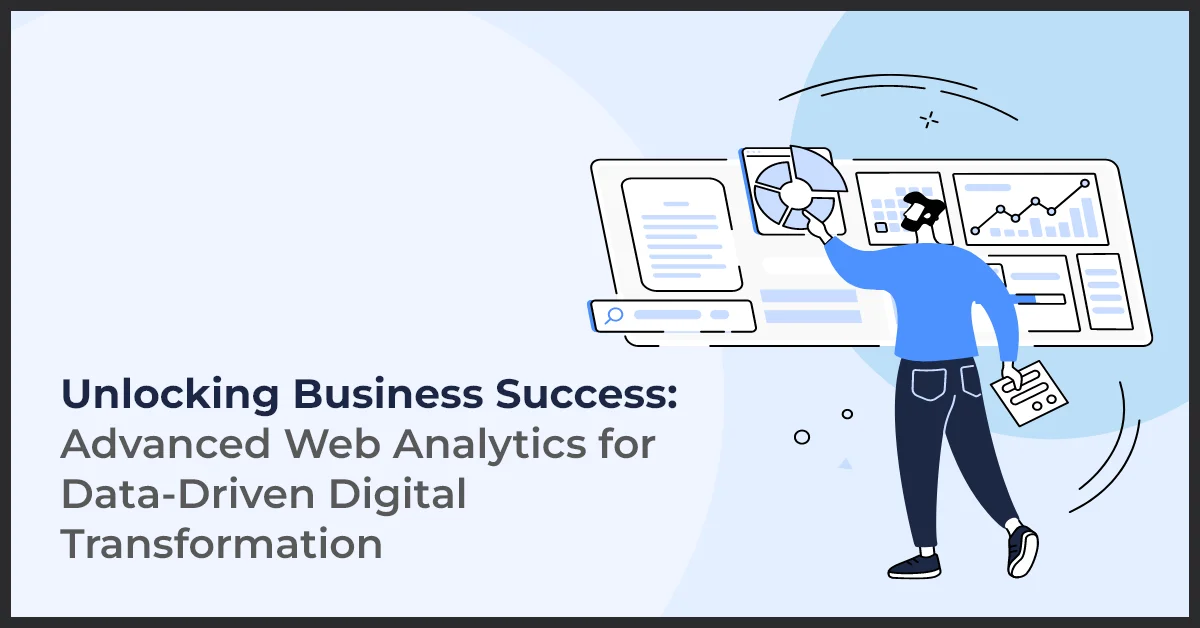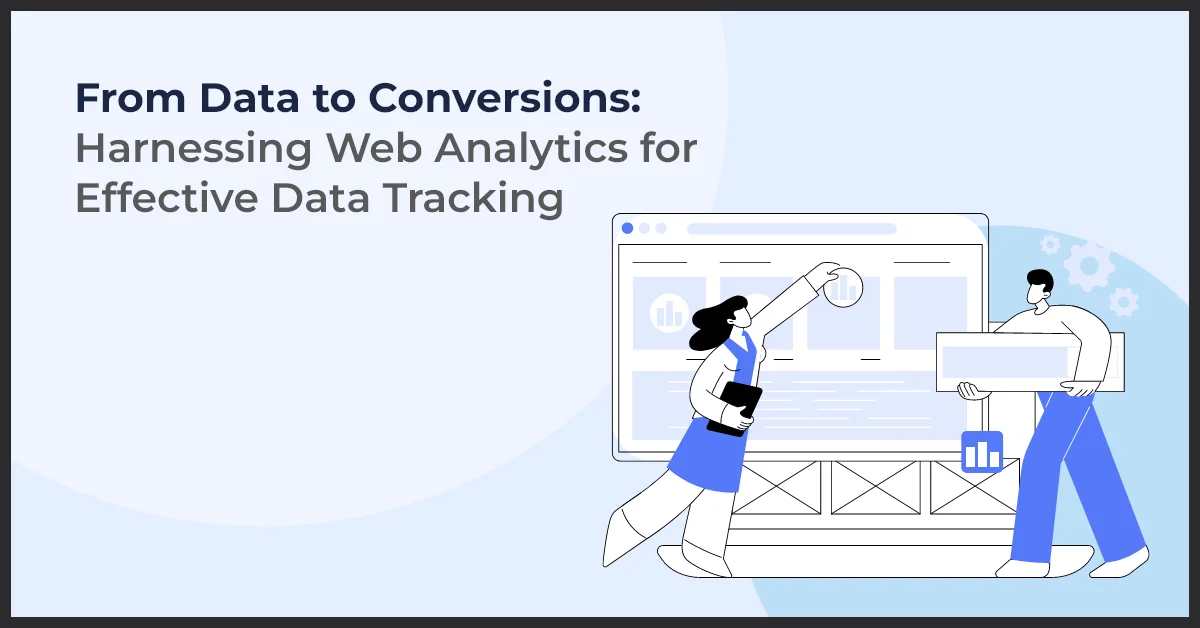Advanced Web Analytics for Data-Driven Digital Transformation

Published on: July 5, 2023
Updated on: February 28, 2025
2826 Views
- Web Analytics
10 min read
Advanced web analytics provide a powerful lever in the engine of digital transformation. They offer a means to collect, track, analyze, and interpret data from various online sources. These data-driven insights facilitate informed decision-making, which is fundamental to any digital transformation initiative.
In this era of digitization, businesses that fail to adopt advanced web analytics risk being left behind as they need more insight to keep up with rapidly changing market trends and consumer behavior.
This blog post will illustrate how advanced analytics empowers businesses to navigate their digital transformation journey. It will shed light on the evolution of web analytics, its potential to drive growth and efficiency for small businesses, and how it can shape marketing strategies and decision-making processes.
What Is Web Analytics?
Web analytics involves the collection and examination of data to gain insights into how users interact with web pages.
Analytics tools track and analyze various aspects of website activity, such as the number of visitors, the duration of their visit, the number of pages they browse, the specific pages they access, and whether they landed on the site through a link.
Companies employ web analytics tools to assess and compare their website's performance and to monitor critical business performance metrics, like the rate of conversions into purchases.
Evolution of Web Analytics and Its Impact Today
Web analytics has evolved significantly from merely tracking website visits and page views. Today, it encompasses a comprehensive understanding of user behavior, preferences, and experiences, tracking complex user interactions and even predictive analytics. Factors contributing to strategic growth and business success, such as data-driven decisions, customizing user experiences, optimizing marketing campaigns, and understanding competition, are now possible.
Small businesses stand to gain a lot by harnessing the power of data analytics. By understanding user behavior, identifying trends, monitoring website performance, and more, small businesses can increase customer engagement, improve conversion rates, optimize marketing spend, and identify areas of operational efficiency. These lead to growth, increased profitability, and overall business success.
Web Analytics and Its Advantages for Business Success
1. Marketing Strategies: Tracking and Data
Advanced web analytics play a crucial role in shaping effective marketing strategies. By
understanding user behavior, businesses can create personalized marketing campaigns that resonate with the target audience.
Moreover, it provides quantifiable metrics about marketing campaign effectiveness, which aids in making data-driven decisions to tweak and improve strategies. By making informed decisions based on data, businesses can reduce risk, improve efficiency, and enhance the overall effectiveness of their marketing efforts.
2. Optimize Business Performance
Advanced web analytics provide insights that help businesses identify opportunities for improvement. Techniques such as segmentation analysis allow businesses to identify high-performing customer segments, while funnel analysis can highlight stages in the customer journey where users drop off.
Similarly, cohort analysis can provide insights into the behavior of specific groups of customers over time. By harnessing these techniques, businesses can optimize their performance and increase their profitability.
3. User Behavior
Advanced web analytics tools provide deep insights into user behavior. By tracking user interactions with a website, businesses can understand what users are looking for, how they navigate the website, and where they encounter difficulties. This understanding can guide improvements to the user experience, which in turn can lead to higher engagement and conversion rates.
4. Advanced Tracking and Tools for Small Businesses
There are numerous advanced tracking and analytics tools available that cater to the needs of small businesses. These include Google Analytics, Adobe Analytics, and Mixpanel, among others. These tools offer real-time tracking, user segmentation, custom reporting, and integration with other tools and platforms.
By leveraging these tools, small businesses can gain valuable insights to drive their growth and success.
5. Personalization and Targeting Strategies
Advanced web analytics provide a wealth of data that can be used to tailor personalized marketing strategies. By understanding user behavior, preferences, and demographics, businesses can create targeted marketing campaigns that resonate with their audience. This personalization increases engagement, improves customer satisfaction, and leads to higher conversion rates.
6. Maximizing ROI with Advanced Campaign Analytics
Advanced campaign analytics allow businesses to measure the effectiveness of their marketing campaigns. They provide insights into engagement, conversion rate, and customer lifetime value. Businesses can use these insights to optimize their marketing strategies, allocate resources effectively, and maximize their return on investment (ROI).
7. Enhancing Customer Experience through Advanced Web Analytics
Advanced web analytics also play a key role in enhancing the customer experience. They provide insights into the customer journey, identifying areas where customers may be facing challenges or where the user experience can be improved.
By making data-driven improvements to the customer experience, businesses can increase customer satisfaction and loyalty, which ultimately drives business success.
Web Analytics Tools
Web analytics tools offer insights into where website traffic comes from, how users explore and interact with a website, which content and webpages engage them the most, and whether they make meaningful actions or conversions on the site, such as purchases or contact requests. Marketers utilize this data to enhance channel and website performance through data-driven decisions.
There are several analytics tools currently available, with options that are free or require a paid subscription. The features, functionality, and support vary between paid and free products.
Various analytics packages exist, including:
- Google Analytics and Google Analytics 360, part of the Google Marketing Platform
- Adobe Analytics
- Woopra
- Kissmetrics
- Webtrends
- Piwik
Google Analytics
Google Analytics is the most popular and widely used analytics program, with a free version that suits most users' needs. Google Analytics 360, the paid version, offers more in-depth reporting and larger sample sizes, primarily serving websites with over 10 million monthly page views.
Google Analytics is the single 'source of truth' for website traffic, engagement, and conversion data due to its extensive functionality and widespread use.
Catch the Next Wave - Leverage Google Analytics 4
Google Analytics 4 (GA4) unveils innovative core features that enhance, and in some cases, supersede those of its predecessor, Universal Analytics. To maximize the utility of any business tool, understanding its functionality is crucial.
The revamped features in GA4 empower digital marketers with a deeper comprehension of their audience. The new web analytics tools, rooted in advanced technologies, yield more useful and pertinent information. Simultaneously, they simplify adherence to privacy standards and data protection regulations.
Additional Benefits of Google Analytics 4
One of the most influential features in Google Analytics, particularly relevant for small businesses, is the application of machine learning to deliver smarter marketing insights. Predictive metrics automatically identify and showcase customer trends and user behavior, predicting the likelihood of users making purchases or churning (ceasing to make purchases or bring value to your business).
Predictive Metrics
Predictive metrics also enable you to construct audience segments and perform data explorations. This capability lets you discover patterns in your data, which might not be noticeable using traditional data analysis methods. For instance, predictive metrics can forecast revenue from a particular customer group, allowing digital marketers to segregate their audience by demographic. They can then leverage machine learning to comprehend conversion rates, focusing marketing resources on the audience segments with the highest return on investment.
Google Analytics 4 also employs machine learning for identity resolution. This means it can associate interactions with your product with a specific user without explicit ID linking. As a result, you can identify individual users probabilistically as they move between devices or resume sessions at different times or locations.
You can learn how to use web analytics software like GA4 effectively through many great online programs, including courses offered by Google Analytics Academy, Coursera, edX, and LinkedIn Learning. These platforms provide comprehensive courses covering everything from the basics to advanced concepts.
Advanced Web Analytics: The Future Ahead
The technological advances over the past two decades, however, have significantly changed how we process, analyze, and use data. Now, to achieve their long-term objectives around growth, social responsibility, and competitive advantage, businesses are investing in digital technologies. These technologies include the Internet Of Things (IoT), Artificial Intelligence (AI), Machine Learning (ML), and Data Mining, enabling them to reach their goals through simple and smart initiatives.
Overview of AI-driven Insights and Predictive Analytics
Artificial Intelligence (AI) and predictive analytics are poised to revolutionize the field of web analytics. AI algorithms can sift through vast amounts of data, identifying patterns and trends that may be overlooked by humans. Meanwhile, predictive analytics uses historical data to predict future trends, enabling businesses to anticipate market changes and customer behaviors. These tools enhance decision-making, helping businesses become more proactive and strategic.
The Role of Voice Analytics and IoT in Advanced Web Analytics
With the rise of smart devices and voice search, voice analytics and the Internet of Things (IoT) are becoming increasingly important in web analytics. Voice analytics can provide insights into customer sentiments and preferences, while IoT devices generate a wealth of data about user behaviors and interactions. These technologies offer new opportunities for businesses to understand their customers and optimize their strategies.
Emerging Technologies and Their Impact on Advanced Web Analytics
Emerging technologies, such as Augmented Reality (AR), Virtual Reality (VR), and 5G, are set to have a significant impact on advanced web analytics. These technologies will generate new types of data and create new ways for customers to interact with businesses. As these technologies continue to evolve, advanced web analytics will need to adapt to continue providing valuable insights.
Key Takeaways
- Unlocking Business Potential with Advanced Web Analytics: By leveraging advanced web analytics, businesses can gain deep insights into user behavior, optimize marketing strategies, and drive digital transformation. This approach helps companies stay competitive in a rapidly evolving market.
- Enhancing Decision-Making: Advanced web analytics tools like Google Analytics 4 provide predictive metrics and machine learning capabilities, enabling businesses to make informed decisions based on data-driven insights. This leads to improved marketing ROI and operational efficiency.
- Personalization and Customer Experience: Advanced analytics allow for personalized marketing strategies by understanding user preferences and demographics. This personalization enhances customer satisfaction, leading to higher engagement and conversion rates.
- Future of Web Analytics: Emerging technologies such as AI, IoT, and predictive analytics are transforming web analytics. Businesses that adopt these technologies can anticipate market trends and customer behaviors more effectively.
Conclusion
Advanced web analytics play a critical role in driving digital transformation. They provide businesses with the data and insights they need to understand their customers, optimize their operations, and make strategic decisions. In today's digital age, the ability to leverage advanced web analytics is not just a competitive advantage—it's a necessity.
Small businesses, in particular, stand to benefit significantly from advanced web analytics. By embracing these tools, small businesses can gain a better understanding of their market, improve their strategies, and drive growth. With the right approach, advanced web analytics can unlock business success and facilitate data-driven digital transformation.
We are here to help you implement and unleash the power of advanced web analytics for your small business. Email us at info@growthnatives.com or call +1 855-693-4769 and watch how much more you can learn about your customers and their needs.
Frequently Asked Questions
Advanced web analytics uses sophisticated tools and techniques to analyze complex data patterns, user behaviors, and website trends, providing deeper insights for optimized digital strategies.
Web analytics inform digital decision-making by providing data-driven insights into user behavior, site performance, and marketing effectiveness. They enable strategic adjustments and improvements based on real-time data.
Google Analytics is a specific tool for web analytics. In contrast, web analytics broadly refers to the practice and methods of analyzing web data, including various tools and platforms beyond Google Analytics.
Advanced analytics support digital transformation by offering deeper insights into data, predicting trends, and guiding strategic decisions, which helps businesses adapt to changing markets and enhance their digital strategies.
Web analytics offer improved decision-making, enhanced user experience, better marketing ROI, and data-driven insights, helping businesses optimize their online presence and achieve strategic goals.



